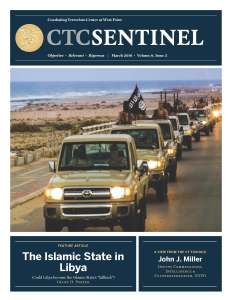From the Editor
Our March issue features a conversation between John Miller, NYPD Deputy Commissioner for Intelligence & Counterterrorism, and Ambassador Michael Sheehan, Distinguished Chair of the Combating Terrorism Center, who himself served as NYPD’s Deputy Commissioner for Counterterrorism between 2003 and 2006. Miller reflects on the significant changes over the intervening decade in both the nature of the terrorist threat and the operating environment for law enforcement agencies, and outlines some of the recent measures taken to protect New York City. With the Islamic State losing ground in Iraq and Syria, our feature article by Geoff Porter examines whether Libya is a realistic fallback option for the group. He argues that the Islamic State’s momentum in Libya is slowing and a number of factors, including a shortage of manpower, competition with other militia groups, and a lack of exploitable sectarian tension, will make it difficult for the group to seize control of additional territory. After recently returning from a trip to the region, Peter Chalk examines the current militant landscape in the Philippines and finds that, despite pledges of allegiance to the Islamic State from some jihadi groupings, the country is “unlikely to emerge as a new beachhead for fostering the Islamic State’s regional extremism.” Andrew Watkins explores why there may be a strong correlation between territorial losses inflicted on the Islamic State and the group’s increasingly global campaign of terrorism, and warns further setbacks for the group could lead to a surge in international attacks, at least in the short-term. Raffaello Pantucci draws on trial documents from recent terrorism cases in the United Kingdom to paint a picture of the threat faced by the country. While recent trials have not shown clear evidence of Islamic State direction, he argues that could change as the group pivots toward international terror. Finally, Ari Weisfuse profiles Saif al-`Adl, a veteran al-Qa`ida operative who several prominent Western news organizations reported was released by Iran last year. While not confirmed, his release would be a boon to the terrorist group.
Paul Cruickshank, Editor in Chief
 Skip to content
Skip to content

